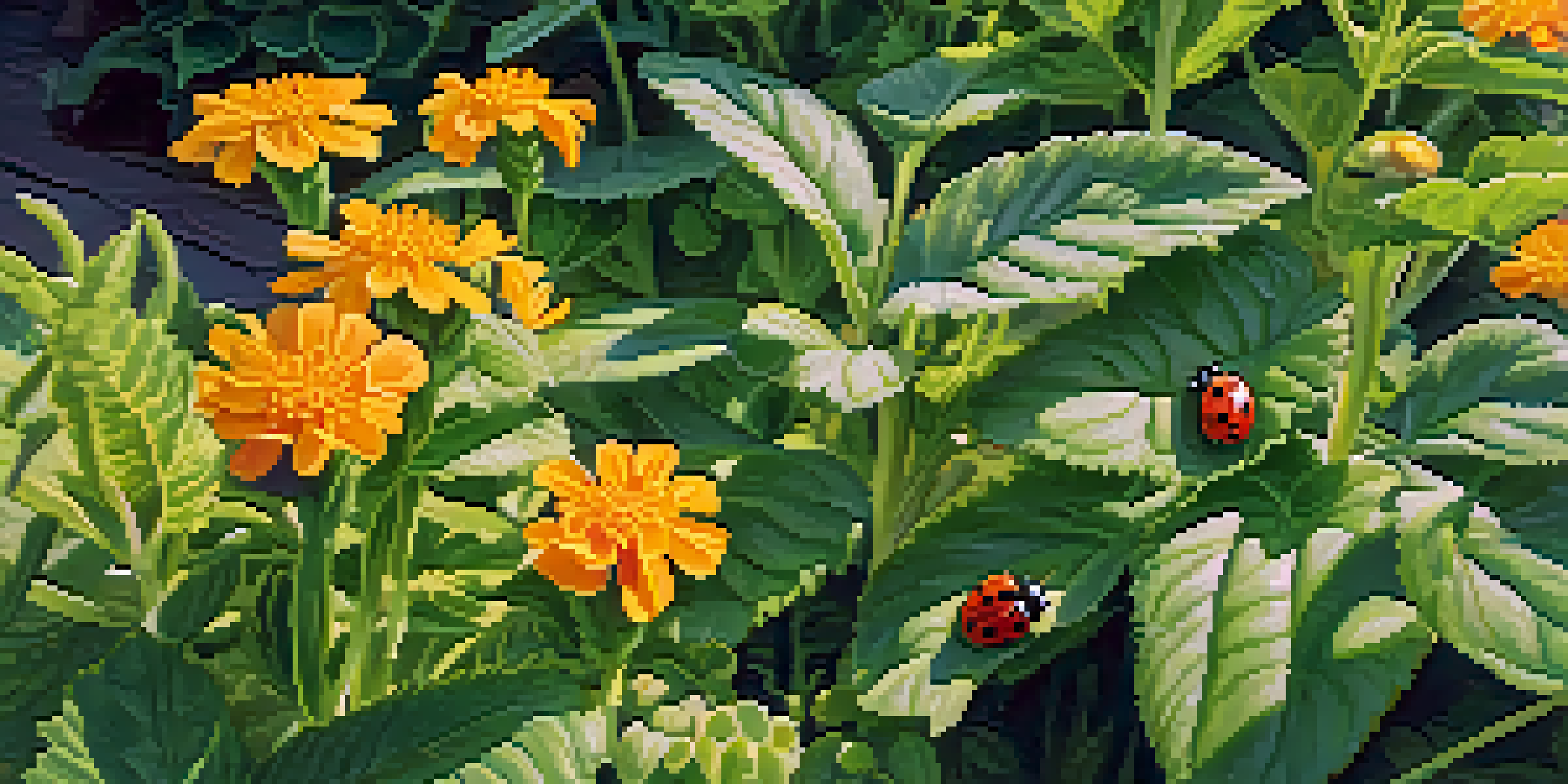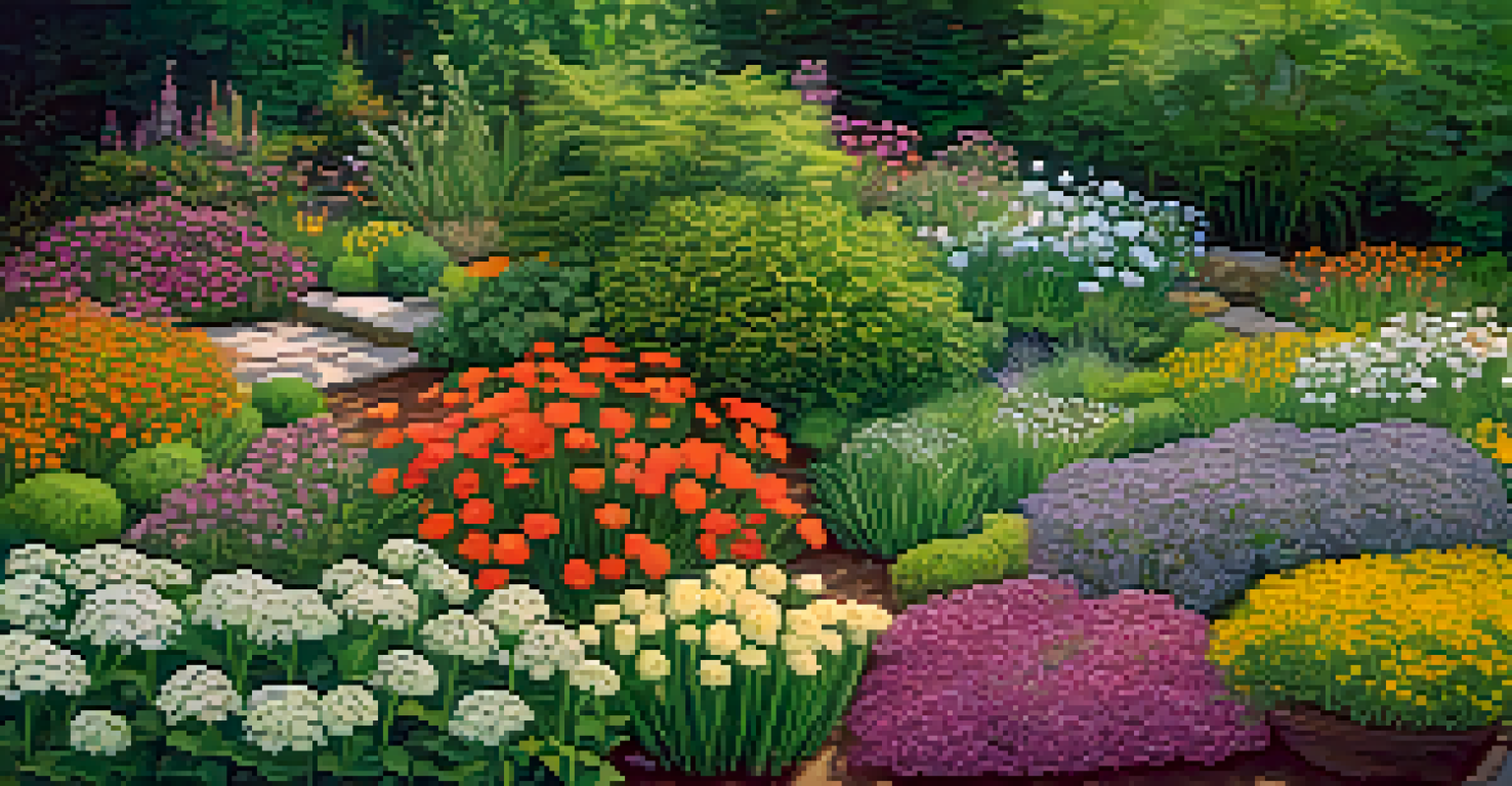Effective Strategies for Managing Aphids on Your Plants

Understanding Aphids: The Tiny Garden Pests
Aphids are small, soft-bodied insects that can wreak havoc on your plants. They feed on plant sap, leading to wilting, yellowing, and even death if left unchecked. Understanding their life cycle is crucial; they reproduce quickly and can form large colonies in a short time.
The best way to control pests is to create a healthy ecosystem where natural predators thrive.
These pests can be found on various plants, from roses to vegetables, and they often cluster on the undersides of leaves. Their presence can also attract other pests, like ants, which farm them for honeydew. Knowing where to look for these sneaky invaders is the first step in managing them effectively.
Identifying aphids early can save you from significant damage. Regularly inspecting your plants will help you spot these pests before they become a full-blown infestation. The sooner you act, the easier it is to protect your garden.
Natural Predators: Allies in the Garden
One of the best ways to manage aphids is by inviting their natural predators into your garden. Ladybugs, lacewings, and parasitic wasps all feast on aphids, helping to keep their populations in check. By creating a welcoming environment for these beneficial insects, you can establish a natural balance in your garden ecosystem.

Planting flowers like marigolds and dill can attract these predators, providing them with food and shelter. The presence of these allies can drastically reduce your aphid problem without the need for harsh chemicals. It's like having a team of tiny superheroes protecting your plants!
Aphids: Quick and Destructive Pests
Aphids are small insects that can rapidly damage plants by feeding on their sap, leading to wilting and potential plant death.
Encouraging natural predators not only helps control aphids but also promotes overall garden health. A diverse garden with various plants supports a range of beneficial insects, making it resilient against various pests and diseases.
Homemade Solutions: Simple and Effective
If you prefer a hands-on approach, there are several homemade solutions to manage aphids. A simple mixture of water and dish soap can be sprayed directly onto the affected plants. This solution suffocates the aphids while being gentle on your plants, making it an excellent option for organic gardeners.
An ounce of prevention is worth a pound of cure.
Another effective remedy is neem oil, derived from the seeds of the neem tree. This oil disrupts the life cycle of aphids and deters them from feeding. It's a powerful yet natural solution that can help eliminate aphids without harming beneficial insects when used properly.
Using these homemade solutions not only helps with aphid control but also empowers you as a gardener. You get to take an active role in protecting your plants while minimizing the use of chemical pesticides.
Companion Planting: A Proactive Approach
Companion planting is an age-old technique that involves growing certain plants together for mutual benefit. Some plants, like garlic and chives, can repel aphids, making them excellent companions for more susceptible plants. By strategically placing these pest-repelling plants throughout your garden, you can create a natural barrier against aphids.
Additionally, certain flowering plants, such as alyssum and yarrow, attract beneficial insects that prey on aphids. This approach not only helps manage pests but also enhances the beauty of your garden. It's a win-win situation!
Natural Predators Help Control Aphids
Inviting beneficial insects like ladybugs and lacewings into your garden can naturally reduce aphid populations without chemicals.
Incorporating companion planting into your garden strategy fosters a healthier ecosystem. By promoting diversity, you improve plant resilience and make your garden less appealing to pests like aphids.
Maintaining Plant Health: The Best Defense
Healthy plants are less susceptible to aphid infestations. Regular care, such as watering, fertilizing, and pruning, strengthens plants and makes them more resilient. A well-nourished plant can better withstand stress and pest attacks, reducing the likelihood of aphid problems.
It's essential to choose disease-resistant varieties and to ensure your plants are suited to your climate and soil conditions. When plants thrive in their environment, they're less likely to attract pests. Think of it as creating a fortress around your plants to keep them safe.
Additionally, proper spacing between plants allows for good air circulation, reducing humidity that aphids thrive in. By maintaining your plants' health, you're actively preventing aphid infestations before they even start.
Chemical Control: When to Consider It
While natural methods are often preferred, there are situations where chemical control may be necessary. If an aphid infestation is severe and other methods aren't working, using insecticidal soap or targeted pesticides can be effective. However, it's crucial to choose products that are safe for both your plants and beneficial insects.
Before applying any chemicals, always read the label and follow instructions carefully. Timing is also critical; applying treatments in the early morning or late evening minimizes harm to beneficial pollinators. This way, you can tackle the aphid problem while being mindful of the entire ecosystem.
Healthy Plants Resist Aphid Attacks
Maintaining plant health through proper care and companion planting strengthens plants and makes them less susceptible to aphid infestations.
Using chemical control should be a last resort, reserved for situations where your plants are at significant risk. By combining this approach with natural methods, you can achieve a balanced and effective pest management strategy.
Monitoring and Prevention: Staying One Step Ahead
Ongoing monitoring is key to managing aphids effectively. Regularly check your plants for signs of aphids or damage, and act promptly if you spot any. Keeping a close eye on your plants allows you to catch aphid populations before they explode, saving you time and effort in the long run.
Preventive measures are also essential. Maintaining a clean garden, removing weeds, and rotating crops can help deter aphids from making your garden their home. Think of it as setting up barriers and obstacles to keep potential pests at bay.

By staying vigilant and proactive, you can create an environment that minimizes the risk of aphid infestations. A little attention goes a long way in maintaining a healthy and thriving garden.